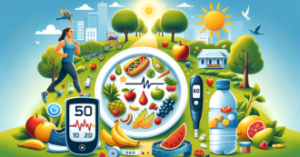For high cholesterol, it is generally recommended to follow a heart-healthy diet. This includes limiting saturated fats and avoiding trans fats. Eat foods with a high fiber content such as oatmeal and beans, and unsaturated fats such as avocados and nuts. These foods may help increase the high-density lipoprotein (HDL) also called “good cholesterol”, while decreasing the low-density lipoprotein (LDL) or “bad cholesterol”.
Table of Contents
Here are some foods that can be included in a diet for managing high cholesterol:
Fruits and Vegetables:

- Berries (blueberries, strawberries, raspberries)
- Apples, oranges, and other citrus fruits
- Leafy greens (spinach, kale, collard greens)
- Broccoli, cauliflower, and brussels sprouts
Whole Grains:

- Oatmeal/oats
- Quinoa
- Brown rice
- Whole wheat bread
- Whole wheat pasta
Lean Proteins:

- Skinless poultry (chicken, turkey)
- Fish (especially fatty fish like salmon, mackerel, and trout)
- Beans and legumes
- Tofu and other soy-based products
Nuts and Seeds:

- Almonds, walnuts, and other nuts
- Chia seeds, flaxseeds, and sunflower seeds
Healthy Fats:

- Avocados
- Olive oil and avocado oil
- Fatty fish (salmon, mackerel, trout)
- Nuts and seeds
Dairy or Dairy Alternatives:

- Low-fat or fat-free yogurt
- Skim milk or fortified plant-based milk (e.g. almond milk)
- Low-fat cheese
Herbs and Spices:

- Garlic
- Turmeric
- Ginger
- Cinnamon
Fiber-Rich Foods:

- Oatmeal
- Legumes (beans, lentils)
- Whole grains
- Fruits and vegetables
Foods to limit or stay away from include:

- Fried foods
- Processed foods
- Fatty cuts of meat
- Full-fat dairy products
- Foods with partially hydrogenated oils


